Why don’t the big agencies co-operate more effectively with locals?
Given that many of the problems of ‘big aid’ are built in, sharing resources and projects with local organisations sounds like the best option. A lot of people work toward this in one way or another, but it can be quite a slog. The authors of Breaking the Cycle – Localising Humanitarian Aid in Ukraine, an article originally from Forced Migration Review and published on the Refugees International website in November 2023, looked at the barriers to localisation, concluding that:
Most Ukrainian relief groups cannot meet donor and aid agency reporting requirements.
Donor agencies lack the staff to manage a large number of small-value grants.
Donor agencies are highly concerned with potential aid diversion and corruption.
The largest agencies are “guided by core humanitarian principles of independence, neutrality and impartiality”, while many Ukrainian groups “view their relief efforts as part of whole-of-society resistance to the Russian invasion and, for them, the distinction between aid for soldiers versus civilians does not carry the same significance”.
Commentary on the above based on my and my fellow volunteers’ practical experience:
These requirements can be challenging to meet, or even lethal. For example, I know a small team which gave up distributing Red Cross food packages because of the requirement to document every package that was given out – i.e. have a queue of old ladies signing bits of paper and posing for photos in a village near the front line where they could be hit by artillery at any moment.
They could use some of the oceans of cash to hire them?
Yes, sometimes if you give a granny in a bombed-out village a box of aid she will sit by the side of the road and sell the contents on piecemeal as soon as your van has driven off. This does happen, especially as the contents of the box may not actually be much use to her (see interview with Sashko Protyah, below). Is that a real-life, humanly defensible reason to refuse to fund the tiny hands-on organisations supplying those places in favour of building play areas in railway stations?
No matter how often it is repeated to them, Ukrainians are unlikely to ever come on board with the idea that it’s morally commendable to supply children with nappies but immoral to supply soldiers with winter clothes so they don’t freeze to death while defending their children from a genocidal horde.
In the corporate and pseudo-corporate NGO world there’s always an excuse for being a bit rubbish. If volunteers on the ground indulge in that, the result is (more) people dying around them.
‘We Need People who are Focused on the Mission, Not on Rules and Procedures’ quoted Olena Shevchenko, who runs two NGOs within Ukraine, as saying: “It took two months to establish communication with medium-sized donors and just start talking to the big ones. For them, responding quickly is something impossible. I saw a different reality: I was asked to fill out an Excel spreadsheet indicating needs. We were doing this 24/7: collecting lists, proofreading, translating—and we got nothing in two months. You send them the needs, and they cut it all,” she said, so that “instead of 5,000 units of diapers, you only get 10 packs.”
While writing this article I talked with Sashko Protyah about his experience. You’ll know Sashko if you’re a regular reader: he’s an IDP from Mariupol and a humanitarian volunteer and filmmaker with the Freefilmers’ collective.
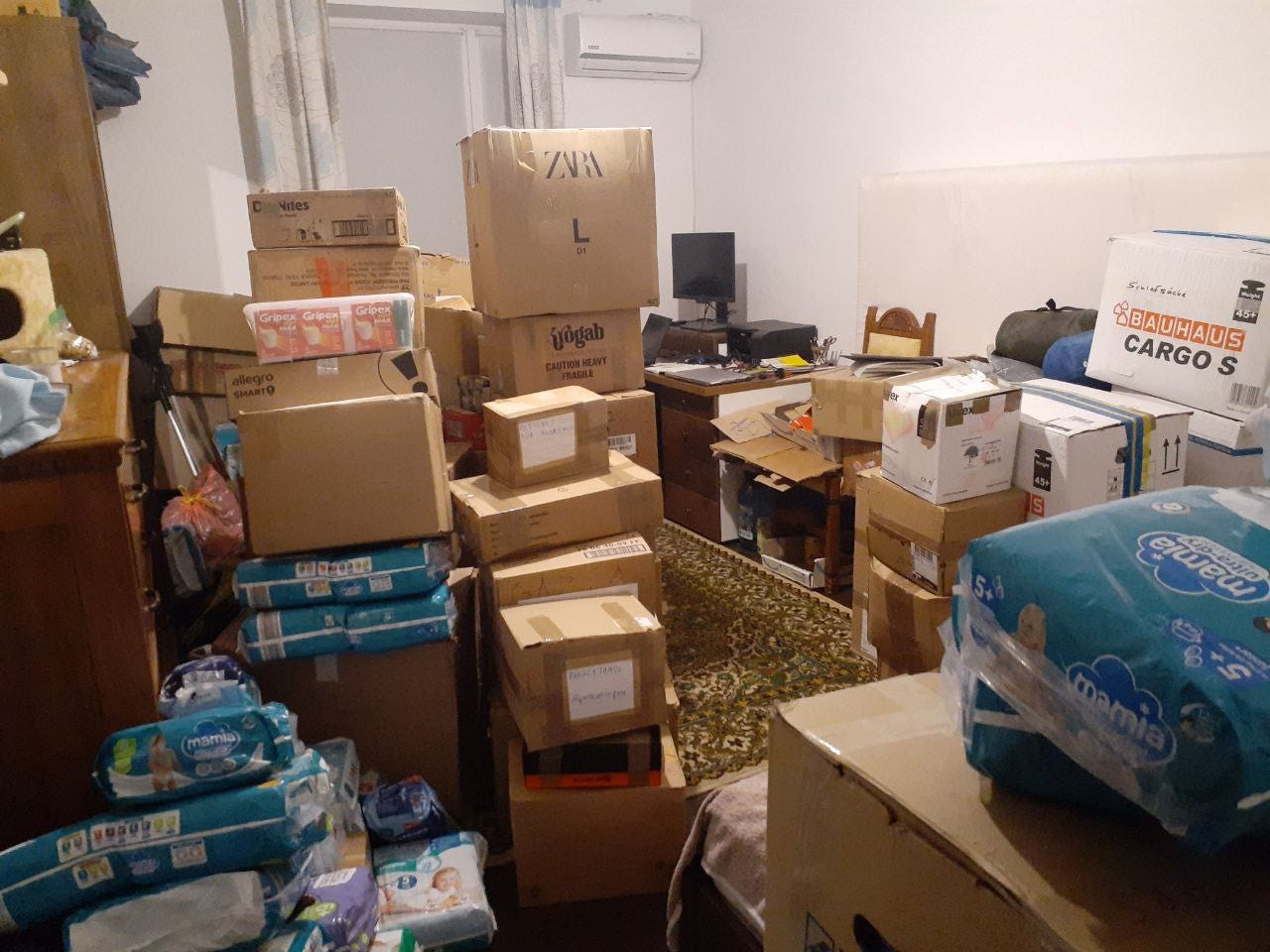
Sashko: There are two sides to the question [of aid agencies]. One the one hand, it’s difficult to provide for tens of thousands of refugees just by means of small, community-oriented NGOs. Or for example if you talk about the evacuation of hospitals or bringing valuable hospital equipment that costs millions of hryvnias then of course it can be done only by large organisations.
Aid boxes
But many people consider them inefficient and their work inadequate. There’s a total disconnect between what the IDPs need, and what the large agencies offer. They often provide things refugees or IDPs haven’t asked for. The boxes that are distributed once a month in huge humanitarian centres – normally no one has collected any information about what the vulnerable people need for survival. They just put whatever they want in those boxes and distribute them. It’s very common, for example, for Mariupol IDPs to leave some of the items from the humanitarian boxes in the office because they will have to pay, I don’t know, twice as much for a taxi to bring those heavy boxes to the places where they are staying, and they don’t need much of what’s in them anyway. Maybe because of dietary restrictions, or they don’t use those type of hygienic items.
[Big NGOs] can’t improve their performance in terms of the items they can provide for the IDPs because they are disconnected from ordinary people. Sometimes they give you a call to ask about the humanitarian aid you have received, but the questions are so impersonal that you just want to answer them as quickly as possible [and hang up]. It’s like some answerphone call you receive after some bank service. And you don’t want to look a gift horse in the mouth.
It would make much more sense to give vouchers or cash so IDPs could buy what they really need themselves in supermarkets. The system is disconnected from reality and definitely works primarily to provide jobs for managers, and only secondarily to provide aid for IDPs. It’s the same with both large centres in Ukraine and international organisations, I’ve heard that from IDPs many times. When you go to Ya Mariupol [an aid centre with branches in cities around Ukraine] you see young guys in smart suits who look like Metinvest managers and you just think, What are they doing here?
Red Tape
Something I’ve heard a lot about in villages is how long every procedure takes. For example the International Red Cross launched a programme promising to provide villages with firewood, but in at least one place it has ended up with so much red tape and bureaucracy that the winter has started and no firewood has been delivered.
They contacted Kateryna [a community leader in the Kharkiv village of Mospanove] and told her they were planning to send her some application documents, then disappeared. She never received any messages or phone calls from them after that.
The situation with firewood in Mospanove is quite critical because villagers have started collecting firewood from posadkas [treelines] which is dangerous as the whole area was heavily mined by the Russians. There haven’t been any casualties yet, but it’s not a good idea to collect firewood in the posadkas near Mospanove.
So it’s absolutely OK to be critical about large NGOs. But I would welcome constructive criticism of small NGOs as well. This is the way we can work better.
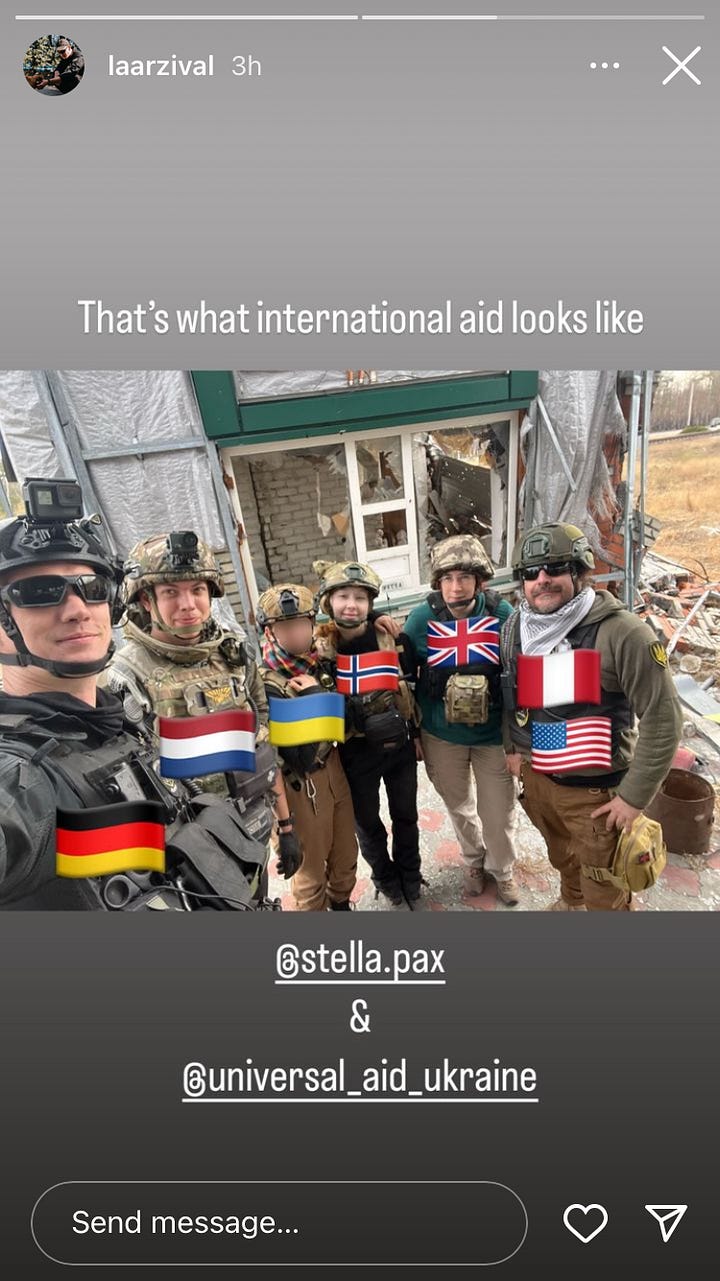
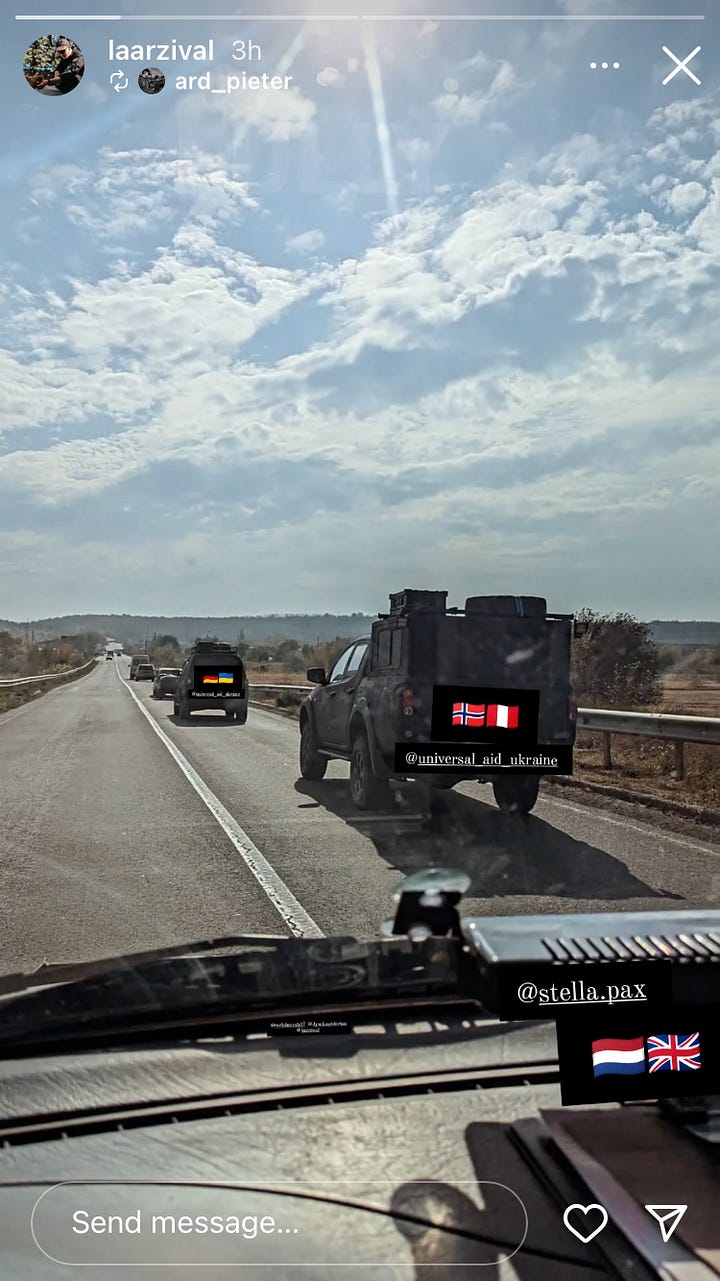
Freefilmers recently published a print zine, Zamotka (contact them via their Instagram to purchase a copy), exploring grassroots food practices and food trauma caused by the war. It features unfiltered Ukrainian voices of the kind not generally heard in Western media, who don’t want to alienate readers. As well as analysing facts and figures, Dafna Rachok, in an article called ‘On Donations and Achievements in Humanitarian Aid’, wrote about her own experiences with a British employee of a UN aid contractor called Henry, who she worked with in spring 2022, declaring, “I hate him – along with his employer and the UN – with all my heart.”
It’s that alarming word again, ‘hate’. Rachok goes on to explain her response in the article, for example: “He [was] looking for volunteer drivers in Ukraine who would agree to go beyond the demarcation line – that is, right into enemy-controlled territory – and deliver food packages. He completely fails to see why this request (innocent, in his eyes) triggers such an emotional response in me and his other interlocutors.”
A guy in a nice office in London, earning a salary for working in the humanitarian industry with the accompanying moral glow that brings, was casually asking Ukrainians to risk their lives. And that’s just the obvious point of infuriation. There’s the further reality that, as Rachok goes on to explain, Ukrainians were/are already doing so in a thousand ways for no pay, with no financial resources except their own, while under constant attack even in many non-occupied areas.
Again, I’d challenge anyone to feel warm and fuzzy about either the UN or its contractors like Henry’s employer, if they were in Rachok’s situation.
Media focus
In possible defence of UN agencies, it may be that they are doing a great deal of unbranded work within Ukraine. Unlike in some crisis-hit countries, they are able to co-operate with the government, which has problems with corruption but is functional. And as Russia is a permanent member of the UN Security Council, they need to be careful not to ‘provoke’ it.
However, corporate aid agencies are very good at getting media coverage, particularly in this case the Red Cross. This can be a great positive for maintaining public attention on Ukraine. But it can also contribute to a distorted picture of the country.
For a striking example of this, go back to the horrific siege of Mariupol, during the first two months of the full-scale invasion. There was heavy coverage of the Russians’ refusal to grant a ‘green corridor’, and the consequent inability of the International Red Cross to access the city and facilitate evacuations. ‘Impossible to proceed’: Red Cross halts Mariupol evacuations (Al Jazeera, 1 April 2022).
However, the story within Ukraine was Red Cross Criticized for Not Doing More in Ukraine (Kyiv Independent, 4 May 2022), including complaints about the organisation ‘prematurely pulling out of Mariupol’. And “‘We have never met the ICRC along the way,” said Ulyana Tokareva from the Council of Women of the Donetsk Oblast, who stepped in to support evacuations and food deliveries in Mariupol in lieu of the UN and the ICRC.” Sounds familiar.
The problem is not just clashing impressions of the value of the International Red Cross, but the way the saga of Red Cross managers’ risk assessment for sending a dozen vehicles along a road became The Story to the exclusion of much else. At the same time, hundreds if not thousands of individual Ukrainian drivers were risking their lives daily to rescue loved ones, friends and strangers from Mariupol and other occupied territories. I’ve met five personally, including a taxi driver in Kyiv, originally from Berdyansk, who told me about being captured and tortured, while driving me to the railway station, a common enough chance conversation. Others include Freefilmers’ friends Anya and Yura, and Azat Azatyan, who has since set up a chain of centres helping IDPs in Zaporizhzhia. The story of evacuations from Mariupol is these people’s bravery, not Red Cross managers’ risk assessments. Sashko’s short film My Favourite Job documented the work of Anya and others like her:
On the other hand, a journalist joining Anya in her van would have occupied precious space needed for an evacuee, and have been taking an unnecessary risk as a passive observer. And I doubt anyone running evacuation missions where their survival depended on not annoying Russians at checkpoints (who would sometimes shoot anyway) wanted to appear in the international media. Nevertheless, the coverage of the Red Cross’s heroic battle likely garnered them hundreds of thousands of pounds, while Anya and Yura had lost everything they owned and were driving in and out of Mariupol in shot-up minibuses, dodging artillery shells with as much expectation of a ‘green corridor’ as they had of a red carpet. It wasn’t just that the Red Cross got the publicity, the problem was the lack of recognition that anything or anyone except the Red Cross mattered. This skewed focus is a significant contributing factor to the environment where the paid Henries of the humanitarian industry can genuinely be unaware of what it means to casually suggest to Ukrainian volunteers that they might like to drive into Russian-held territory to deliver food.
All this isn’t to say there’s no negative coverage of aid programmes in the international press, of course. For example, here are two Guardian articles on the Red Cross’s links to the Kremlin. (March and April 2024), while Amnesty International has repeatedly been accused of victim blaming with regard to Ukraine (Politico article from August 2022). But these tend to be investigations conducted after the fact; exposés rather than questioning the focus on these organisations entirely.
The excellent Counteroffensive Substack looks at extensive concerns surrounding the International Red Cross: How the Red Cross failed Ukraine. (August 2024)
Here’s the Red Cross’s own FAQ about their work in Ukraine (August 2024), including refutations of what they consider false information.
Note that the International Red Cross is distinct from the Ukrainian Red Cross, which is generally well-regarded and seen as doing necessary work. For example, it reopened its Kramatorsk office in May 2024.
Conclusions?
There’s a question mark in that heading because I’ve tried hard to come up with some positives to balance the complaints, but struggled.
I was pleased that the question of how to improve interfacing between international and local organisations, in Tajikistan and Armenia as well as Ukraine, was a big focus of the recent BEARR conference. A lot of people would like to address this problem. But they are on, or supporting, the local, not the big aid, side of the equation. The only solid actionable suggestion I picked up on at that event was the suggestion that large agencies could provide compliance training for local Ukrainian volunteers/workers, to help the latter understand what the former are actually asking of them.
So I have no real answers. I can attest that smaller/volunteer organisations have their own controversies. It’s probably not an opsec violation to reveal that the in-fighting and accusations on volunteer WhatsApp and Telegram groups can reach eye-bleeding intensity, and genuine corruption or wrongdoing is sometimes revealed.
What I do know is that more people need to be aware of the ‘big aid’ question so that decisions on where to donate can be made on as informed a basis as possible. If you’re not comfortable finding an on-the-ground Ukrainian organisation, then I recommend the UK BEARR Trust and the French Small Projects Team, both of whom supply small grants to such groups after formal vetting, with minimal overheads. World Central Kitchen and Caritas have good reputations as medium-sized agencies (see my next post). And please consider telling others about this issue even if they aren’t interested in Ukraine specifically. It affects every major fundraising cause around the world.
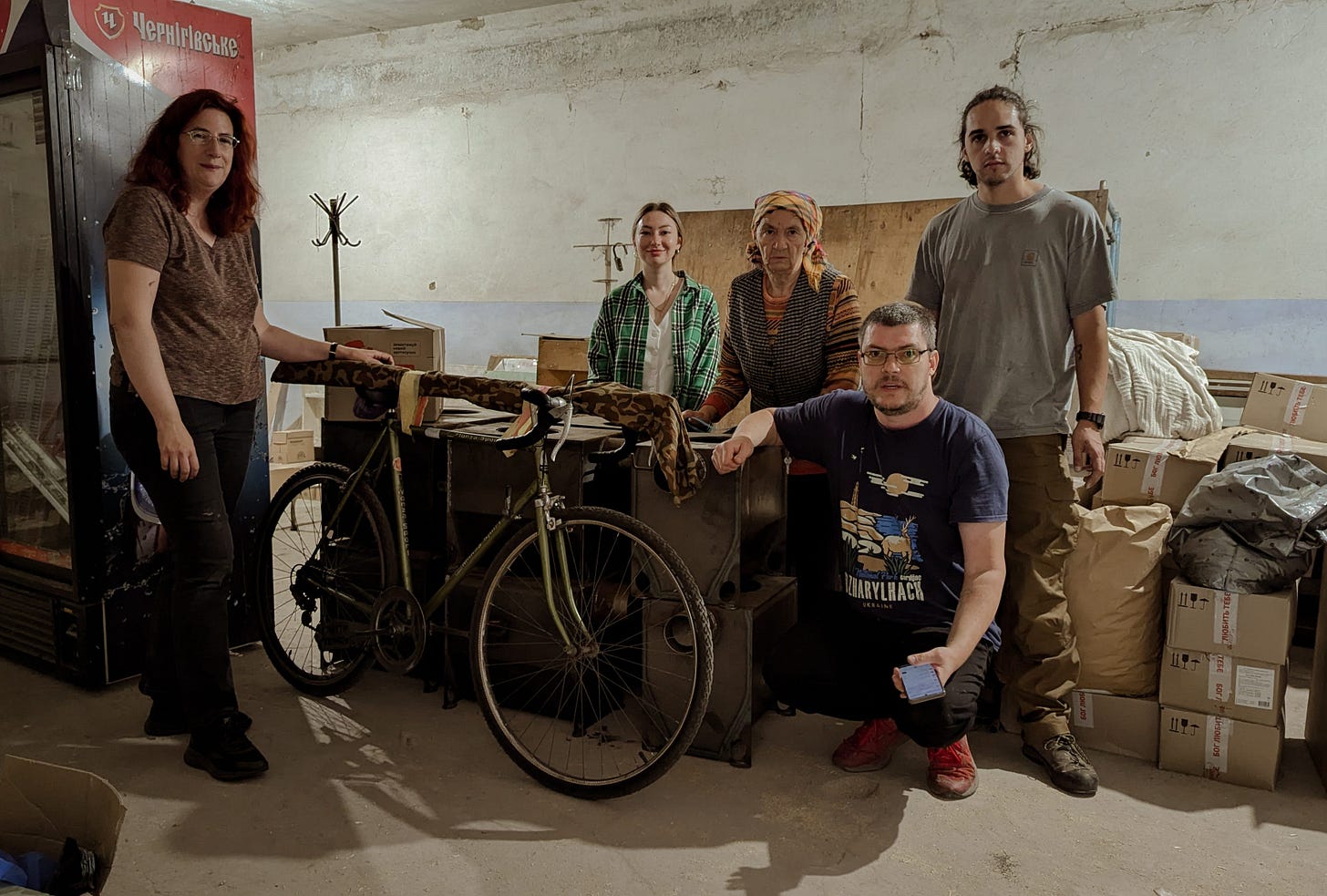
Part 3 consists of longer interviews on the subject of ‘big aid’ with Jonny and Harrison, experienced British volunteers who do rebuilding and aid supply work in south and east Ukraine

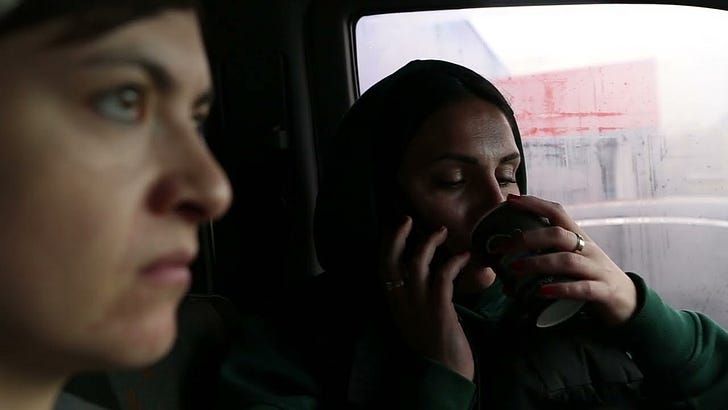


Remember the story of the million starfish washed up on the beach. A child is throwing them back into the sea, one at a time. A passerby says 'That's not going to make a difference'. The child says 'It does to that one'. Maybe we should each just find a Ukrainian that needs help and help that one.
I liked the expression "moral glow". It described my first hand observations when I was a younger person working/volunteering at a cross cultural centre for many of the well known international relief agencies. Before, I go off on a tangent I need to compliment you on a well written report. I will likely read it several times over. My experiences with those who I would consider radiating a "moral glow" was pretty wide. IMHO, that moral glow often engenders massive hypocrisy which for me after a while gave way to me just staying away and not getting involved with any cause or issue. Often, the hypocrisy I am thinking of involved people who often are on the proverbial political left. Well meaning yes, but sometimes dangerous in the same way all fanaticism can be. I like reading about the Ukraine people. I believe what was described is so widespread that perhaps after the war there will be enough critical mass at the institutional level to prevent the kind of rationalism and virtue signaling that corporate media likes to serve as proof of the substance of our so called collective democratic virtues. Case in point, there is a yearly marathon event here in the Twin Cities that claims to be raising money for children with orthopedic issues. It has been proven over and over again that about 98% of the money raised is squandered by the family of the organizer on trips to the Caribbean. The press reports the positive side of a charity raising money for children but hardly a whisper of the down side. I guess the laws here allow for such an abuse and so I guess for the media who likes to have at least one happy news item of the day what's the point of reporting on the down side, except at the collective level that attitude is the same that excuses so much abuse of people who are not even at war, but see such abuses constantly repeated by those who radiate often a certain moral glow. Perhaps I have missed the point.